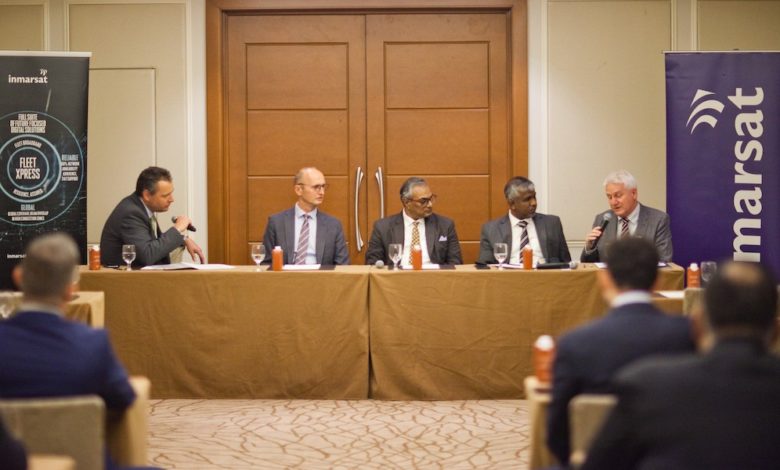Maritime CEO Forum Singapore: The connectivity at sea debate

The Maritime CEO Forums are back after a three-year covid hiatus. The first event took place last week in the stunning surroundings of the Fullerton Hotel. Ahead of the four sessions, organisers created a ‘power hour’ workshop, sponsored by Inmarsat, looking at how connectivity at sea is driving digitalisation, decarbonisation and crew welfare. Panellists were asked to debate where we are at and where we are headed when it comes to connected vessels.
Taking place on World Maritime Day, whose theme this year was new technologies for greener shipping, the session kicked off by questioning whether all the new tech coming onboard ship was developed with sufficient feedback from the end user, namely the world’s seafarers.
Vinod George, deputy managing director at shipmanager OSM Asia, hit out at the lack of engaging seafarers when it comes to technology and the whole decarbonisation and digitalisation debate comparing the situation to a pilot getting on a Boeing airplane he or she had never seen before.
Connectivity is there, it is more about the willingness to pay for it
From the audience, Johan Gustafsson, chief revenue officer at Ocean Technologies Group, said: “If you don’t have the engagement of the crew nothing will ever succeed.”
Discussing how far down the track shipping was in terms of having genuinely connected vessels, Gert-Jan Panken, a vice president at Inmarsat, said his company’s aim was to ensure a connected vessel is the same as a connected office.
“You should not differentiate between a vessel and an onshore setup,” Panken said, conceding that there are still some restrictions to achieving this today when it comes to bandwidth.
“Connectivity has always in the past been seen as a cost but I think what it is is an investment in operational efficiency,” Panken said, turning the debate to one of the key themes of the session – the issue of costs versus investment.
“The conversation is rightly shifting from cost to benefit,” Panken maintained.
Audience member Peter Schellenberger, the managing director at Vanir Marine, told delegates that a lot of the connectivity debate was related to cost, adding how thrilled he was that new players were coming into the market. Another issue slowing progress was the lack of standardisation.
Also speaking from the floor in what turned out to be a highly interactive session, Ronny Waage, a vice president at ScanReach, told attendees: “Connectivity is there, it is more about the willingness to pay for it.”
“We need to show an owner or a charterer the bottom line, where is the P&L going to be,” urged OSM’s George.
“It is a question of value proposition. It is not a question of price,” argued Sanjay Kuttan, chief technology officer at the Global Centre for Maritime Decarbonisation. Kuttan said areas to bear in mind when thinking about the price of connectivity include the impact it has on shipping’s decarbonisation journey; on reliability and safety which should bring insurance premiums down; an on compliance and a ship’s actual licence to operate.
The issue could be resolved by changing vessel descriptions, as such getting ships some kind of smart notation, suggested Punit Oza, the CEO of Wiz Bulk, who pointed out that the awareness factor of which ships are smart and which are not is extremely low among charterers.
All the equipment is there to create connected, integrated ships, argued Morten Lind-Olsen, the CEO of Dualog, it is the decision-making among owners that is slowing the process, he said, comparing shipping to electronic banking, whereby shipping was only at the stage of installing ATMs.
“A newbuilt ship today is, for sure, digital in all respects. You can take as much data out of it as you like. But putting it together and making sense of it all – that is a different thing and shipping is behind on that level,” Lind-Olsen said.
The hour-long session also touched on ESG and how tomorrow’s seafarers will require a totally different mindset. The full session is carried in the video below.
Maritime CEO Forum Singapore 2022 was sponsored by Aderco, Cobham Satcom, CyberOwl, Dualog, Inmarsat, Liberian Registry, Ocean Technologies Group, SEDNA, Synergy Group, Vanir Marine, Wallem, WIZ Bulk and Zero North.
The next Maritime CEO Forum takes place at the Monaco Yacht Club on October 12 while April 24 has been announced as the date for the event’s return to Singapore, timed to coincide with the start of the city’s busy official maritime week.
